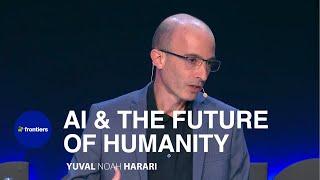This video studies the cognitive biases that affect us when we think about big questions including those in AI risk. We analyze three questions including ones about AGI, misinformation, and existential risk.
We analyze nine different cognitive biases including normalcy bias, the tendency to assume that the world will continue as normal, and reluctance to care for a disaster that has not yet happened. We analyze the three questions to determine which biases might affect those hearing the statements.
We also briefly discussed the path that some people take to understanding existential risk. I came up with seven stages of AI existential risk enlightenment. Where are you on this spectrum?
#ai #existentialrisk #cognitivebias
How brain biases prevent climate action
https://www.bbc.com/future/article/20190304-human-evolution-means-we-can-tackle-climate-change
Climate change inaction: Cognitive bias influencing managers' decision making on environmental sustainability choices. The role of empathy and morality with the need of an integrated and comprehensive perspective
https://pmc.ncbi.nlm.nih.gov/articles/PMC10025319/
Reasoning through arguments against taking AI safety seriously
https://yoshuabengio.org/2024/07/09/reasoning-through-arguments-against-taking-ai-safety-seriously/
Machines of Loving Grace
https://darioamodei.com/machines-of-loving-grace
List of cognitive biases
https://en.wikipedia.org/wiki/List_of_cognitive_biases
0:00 Intro
0:21 Contents
0:30 Part 1: Asking the big questions
0:49 Focusing on upside of AI
1:14 Possible to focus on potential risks
1:41 Yoshua Bengio and optimistic intuitions
2:32 Three questions to focus on
3:04 Part 2: Cognitive biases and other troubles
3:26 Example: motivated cognition
3:58 Present bias, diffusion of responsibility bias, etc
4:35 Detail on cognitive biases
4:40 Bias 1: The framing effect
5:19 Bias 2: Present bias / Hyperbolic discounting
5:49 Bias 3: Bias of diffusion of responsibility
6:30 Bias 4: Egocentric bias, overvaluing own opinion
6:49 Bias 5: Availability bias and personal memory
7:08 Bias 6: Optimism bias
7:15 Bias 7 & 8: Primacy and recency bias
7:33 Bias 9: Normalcy bias, refusal to react to novel disasters
8:00 Many other biases exist
8:12 Part 3: The answers no one wants to hear
8:15 Human disclaimer
8:33 Revisiting the three questions
9:14 Question 1: AGI will automate most jobs
9:39 Possible biases affecting question 1
9:59 Why you may not be taking action
10:34 Biases don't determine whether you should actually support a stance
10:51 Question 2: Misinformation will flood the internet
11:23 Possible biases affecting question 2
11:47 Why society is not taking action
12:20 Question 3: AI could lead to human extinction
12:58 Why you may not agree with this answer
13:39 Why society isn't tackling existential risk
14:33 Seven stages of grief
14:42 Seven stages of AI existential risk enlightenment
15:18 Conclusion
16:25 Outro
We analyze nine different cognitive biases including normalcy bias, the tendency to assume that the world will continue as normal, and reluctance to care for a disaster that has not yet happened. We analyze the three questions to determine which biases might affect those hearing the statements.
We also briefly discussed the path that some people take to understanding existential risk. I came up with seven stages of AI existential risk enlightenment. Where are you on this spectrum?
#ai #existentialrisk #cognitivebias
How brain biases prevent climate action
https://www.bbc.com/future/article/20190304-human-evolution-means-we-can-tackle-climate-change
Climate change inaction: Cognitive bias influencing managers' decision making on environmental sustainability choices. The role of empathy and morality with the need of an integrated and comprehensive perspective
https://pmc.ncbi.nlm.nih.gov/articles/PMC10025319/
Reasoning through arguments against taking AI safety seriously
https://yoshuabengio.org/2024/07/09/reasoning-through-arguments-against-taking-ai-safety-seriously/
Machines of Loving Grace
https://darioamodei.com/machines-of-loving-grace
List of cognitive biases
https://en.wikipedia.org/wiki/List_of_cognitive_biases
0:00 Intro
0:21 Contents
0:30 Part 1: Asking the big questions
0:49 Focusing on upside of AI
1:14 Possible to focus on potential risks
1:41 Yoshua Bengio and optimistic intuitions
2:32 Three questions to focus on
3:04 Part 2: Cognitive biases and other troubles
3:26 Example: motivated cognition
3:58 Present bias, diffusion of responsibility bias, etc
4:35 Detail on cognitive biases
4:40 Bias 1: The framing effect
5:19 Bias 2: Present bias / Hyperbolic discounting
5:49 Bias 3: Bias of diffusion of responsibility
6:30 Bias 4: Egocentric bias, overvaluing own opinion
6:49 Bias 5: Availability bias and personal memory
7:08 Bias 6: Optimism bias
7:15 Bias 7 & 8: Primacy and recency bias
7:33 Bias 9: Normalcy bias, refusal to react to novel disasters
8:00 Many other biases exist
8:12 Part 3: The answers no one wants to hear
8:15 Human disclaimer
8:33 Revisiting the three questions
9:14 Question 1: AGI will automate most jobs
9:39 Possible biases affecting question 1
9:59 Why you may not be taking action
10:34 Biases don't determine whether you should actually support a stance
10:51 Question 2: Misinformation will flood the internet
11:23 Possible biases affecting question 2
11:47 Why society is not taking action
12:20 Question 3: AI could lead to human extinction
12:58 Why you may not agree with this answer
13:39 Why society isn't tackling existential risk
14:33 Seven stages of grief
14:42 Seven stages of AI existential risk enlightenment
15:18 Conclusion
16:25 Outro
- Category
- Artificial Intelligence












Comments